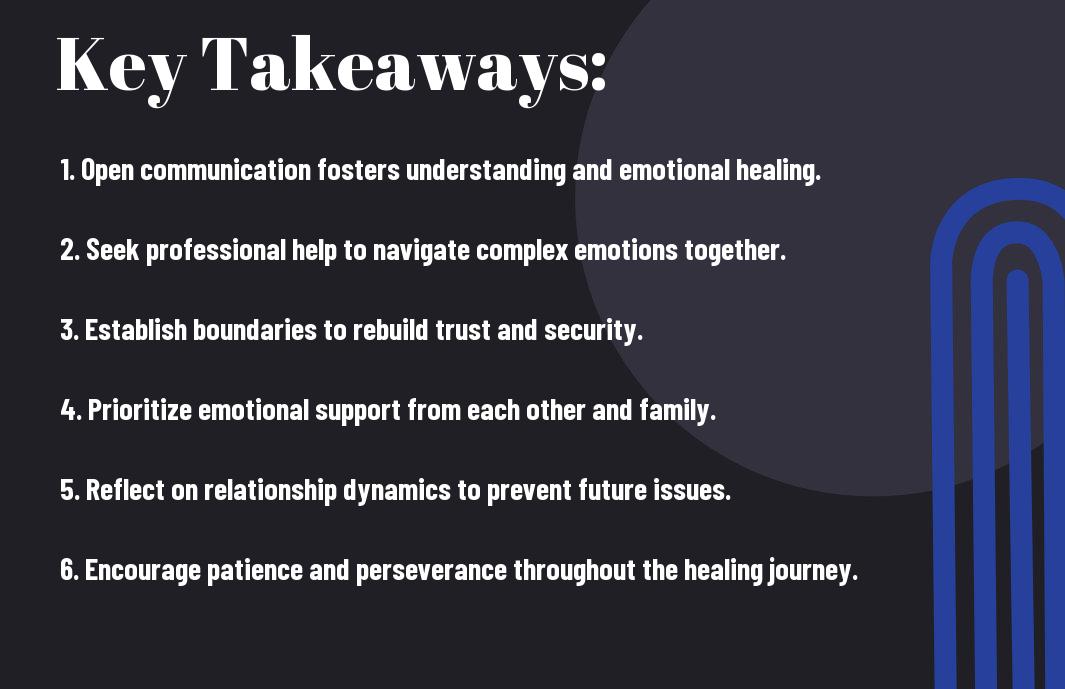Healing from the turmoil of infidelity, especially when it involves a family member, can seem overwhelming. You may be grappling with emotional pain, betrayal, and confusion about the future of your marriage. This journey requires honesty, commitment, and a willingness to confront deep-seated feelings. Understanding the steps to navigate this complex situation can help you rebuild trust and foster a healthier relationship. In this post, we will explore effective strategies and necessary insights to assist you in the healing process.
Key Takeaways:
- Open and honest communication is crucial for healing; both partners should express their feelings and concerns without fear of judgment.
- Seeking professional help, such as couples therapy, can provide guidance and support through the complex emotions and challenges that arise after infidelity.
- Rebuilding trust takes time and consistent effort, including transparency and reliability in actions to demonstrate commitment to the relationship.
- Establishing clear boundaries regarding interactions with the family member involved can help both partners feel safe and secure in their relationship.
- Engaging in empathy and understanding each other’s perspectives can foster a deeper connection and facilitate the healing process.
- Prioritizing self-care is important for both partners to process their emotions and maintain mental well-being during this difficult time.
- Recognizing and addressing underlying issues in the relationship can prevent similar situations from occurring in the future and contribute to long-term stability.

Understanding Infidelity
A complex issue, infidelity can threaten the foundation of your relationship. It often leads to deep emotional pain, confusion, and betrayal. Recognizing its various dimensions is crucial for healing and rebuilding trust.
Definition and Types of Infidelity
Against the backdrop of relationships, infidelity can manifest in multiple ways:
| Emotional Infidelity | Forming strong emotional connections outside the marriage. |
| Physical Infidelity | Engaging in sexual activities with another person. |
| Crossover Infidelity | When the other person is a family member or close friend. |
| Internet Infidelity | Using online platforms for romantic or sexual encounters. |
| Micro-cheating | Small acts that suggest a romantic interest outside your marriage. |
After understanding these types, it becomes clearer how you can begin to address and mend the damage done.
Impact of Infidelity on Marriage
Infidelity can leave a lasting impact on your marriage. It often results in a significant breakdown of trust, leading to feelings of anger, hurt, and confusion. Couples may find themselves struggling to communicate effectively, which can exacerbate existing issues.
Another notable effect involves emotional distancing. The betrayal can provoke guilt, shame, and a spiral of negative emotions, resulting in further alienation between partners. Understanding that healing is a process can facilitate the gradual rebuilding of your relationship, helping you navigate through this challenging situation.
The Emotional Aftermath
If your marriage has been impacted by infidelity involving a family member, you may be grappling with a whirlwind of emotions. Feelings of betrayal, anger, and confusion can permeate your daily life and disrupt your sense of stability. Acknowledging and processing these emotions is crucial for healing, allowing you to navigate the complexities of forgiveness and rebuilding trust.
Grief and Loss
Aftermath can bring an overwhelming sense of grief over the loss of trust and the idealized vision of your marriage. You may mourn not just the relationship as it was, but the innocence that was lost when betrayal entered your lives. Accepting these feelings is a vital step toward recovery, enabling you to reflect on what has changed and what you both need moving forward.
Trust Issues and Betrayal
Along your journey towards healing, trust issues will likely surface as significant hurdles to overcome. The sense of betrayal can linger, causing you to second-guess motives and intentions within your relationship. You might find it challenging to feel safe and secure with your partner, as insecurities or doubts arise. Recognizing that trust can be rebuilt is crucial, requiring both time and open, honest communication.
Trust can be a fragile foundation, often shattered after infidelity. It necessitates consistent effort from both partners to mend what has been broken. Your feelings of vulnerability and doubt are valid, particularly when betrayal comes from someone so close. Fostering an environment of transparency and reaffirming your commitment to one another will be fundamental in conquering these trust issues. Embrace the notion that healing is a gradual process, and with patience and dedication, it is possible to restore your relationship’s foundations and emerge stronger together.

Open Communication
Now, fostering open communication between you and your partner is important for healing after infidelity. It allows both of you to express feelings and concerns while building trust and understanding. Visit How to Save a Marriage After an Affair & Recover … for more insights on navigating this sensitive path.
Importance of Honest Discussions
Around this journey of recovery, having honest discussions is vital for breaking down barriers and fostering empathy. These conversations help both partners to understand the pain caused and facilitate emotional healing.
Creating a Safe Space for Dialogue
Along your healing journey, creating a safe space for dialogue is important. This involves establishing an environment where both partners feel comfortable sharing their thoughts and emotions without fear of judgment or retaliation.
A safe space means actively listening to each other and validating feelings. You can achieve this by choosing a neutral location, minimizing distractions, and taking turns speaking. Emphasizing empathy and respect during these discussions is vital. You should approach sensitive subjects with care, ensuring that both of you feel valued and understood. A solid foundation of trust will allow you to navigate this difficult time together.
Seeking Professional Help
To heal after the emotional turmoil caused by infidelity, seeking professional help is an vital step. Working with a therapist can provide you with the tools and techniques needed to navigate the complex feelings that arise in the aftermath of betrayal. A professional can guide you and your partner through communication barriers, fostering an environment of understanding and support while addressing underlying issues that may have contributed to the infidelity.
Role of Couples Therapy
Role of couples therapy is to create a safe space for both partners to express their feelings and work through the trauma of infidelity. A skilled therapist will facilitate open dialogue, helping you both to understand each other’s perspectives better. This process fosters trust and accountability, which are vital in rebuilding your relationship.
Individual Counseling for Healing
By seeking individual counseling, you can focus on your personal healing journey. A therapist can help you process your emotions, identify patterns, and develop coping strategies to manage the pain of betrayal effectively. This support allows you to gain clarity on your feelings and foster emotional resilience.
In addition, individual counseling provides a valuable opportunity to explore the impact of infidelity on your sense of self and relationships. It allows you to confront negative feelings such as anger or shame, helping you to develop a deeper understanding of your emotions. Through this process, you can also learn to build healthy boundaries and work towards self-forgiveness, which is vital for long-term healing. Ultimately, individual counseling equips you with the necessary insights and skills to begin on a more fulfilling and resilient path, whether that leads to healing within the marriage or personal growth beyond it.

Rebuilding Trust
Despite the deep hurt caused by infidelity involving a family member, rebuilding trust is vital for healing your marriage. This process takes time, patience, and a mutual commitment to transparency and understanding. You will need to navigate difficult conversations, express feelings, and establish new boundaries to foster a sense of safety and security in your relationship.
Steps to Regain Trust
For you to regain trust, start by openly communicating your feelings and concerns with your partner. Create an environment where both of you can share your emotions without judgment. Setting small, achievable goals together can also help rebuild confidence in one another gradually.
Commitment and Accountability
With a strong commitment from both you and your partner, accountability becomes vital in the healing process. This includes being open about feelings, maintaining honesty, and following through on promises made during this recovery phase. Establishing a *shared vision* for the future reinforces your dedication to the relationship.
Rebuilding trust requires consistent effort in demonstrating accountability. This means being reliable in your actions and words while also being willing to confront past mistakes constructively. You must actively participate in addressing each other’s emotional needs and show dedication to healing. Holding yourselves accountable for your behaviors is key to creating a safe space where both can feel valued and respected. By fostering open dialogue and committing to your promises, you can create a stronger foundation for trust to flourish once again.
Reconnecting Through Shared Activities
All relationships benefit from shared experiences, especially after a betrayal. Engaging in activities together allows you to create positive memories and rebuild your connection. By taking the time to enjoy each other’s company, you can start to redefine your relationship and lay the groundwork for healing.
Importance of Quality Time
Among the various ways to reconnect, dedicating time to each other is vital. Quality time fosters understanding and demonstrates commitment to the relationship. It provides a safe space to communicate and build a stronger foundation moving forward.
Re-establishing Emotional Intimacy
Reestablishing emotional intimacy is important in rebuilding trust and repairing your relationship. It requires open communication, vulnerability, and genuine efforts to understand each other’s feelings. As you engage in shared activities, embrace opportunities to discuss your emotions, dreams, and challenges.
Through shared experiences, you create an environment for vulnerability and honesty, which are key to re-establishing emotional intimacy. Make time for heartfelt conversations and express your feelings openly, allowing your partner to share theirs as well. As you navigate this journey together, prioritize active listening and validation of each other’s emotions. This newfound connection can help to mend the hurt and create a more profound bond, fostering a sense of security and trust in your relationship.
To wrap up
Upon reflecting on the journey of healing after infidelity involving a family member, it’s crucial to prioritize open communication and rebuild trust within your relationship. Focus on expressing your feelings honestly while actively listening to your partner’s perspective. Set achievable goals for the relationship and consider seeking professional guidance if needed. Acknowledge the pain but also embrace the possibility of renewed intimacy and understanding. By taking these steps, you can navigate the complexities of your feelings and work towards a healthier, more resilient partnership.
FAQ
Q: What steps should I take immediately after discovering infidelity involving a family member?
A: The initial shock of discovering infidelity can be overwhelming. It’s necessary to allow yourself time to process your emotions. Consider seeking professional help through counseling or therapy to guide you in navigating your feelings. Open communication with your partner about the situation is vital; approach the conversation with honesty and a willingness to listen to each other’s perspectives. Setting boundaries regarding interactions with the family member involved may also be necessary to create a safe space for healing.
Q: How can we rebuild trust after infidelity with a family member?
A: Rebuilding trust takes time and commitment from both partners. It begins with transparency; your partner should be open about their actions and feelings moving forward. Regular check-ins about your relationship can foster communication and intimacy. Working together to establish new boundaries and actively engaging in relationship-building activities can support the trust revival process. Couples therapy can provide a structured environment to help address underlying issues and facilitate dialogue.
Q: What role does forgiveness play in healing from infidelity?
A: Forgiveness is a personal journey that can be pivotal in healing from infidelity. It doesn’t mean condoning the actions but allowing yourself to let go of resentment and anger for your emotional well-being. Engaging in reflective practices, such as journaling or discussing your feelings with a trusted friend or therapist, can aid in understanding your emotions. It’s also important to communicate with your partner about your forgiveness process, ensuring both parties feel supported and understood as you navigate this complex emotion.
Q: Should we involve family members in our healing process?
A: Involving family members can be a double-edged sword. On one hand, it can provide a support network that encourages healing; on the other hand, it can complicate relationships further if not handled delicately. It’s crucial to evaluate the dynamics of your family relationships. If you decide to involve family members, consider setting clear boundaries around the discussions to protect your relationship and ensure confidentiality. Ultimately, your primary focus should be on healing together as a couple.
Q: How can we create a long-term plan for our relationship after infidelity?
A: Creating a long-term plan involves setting shared goals for your relationship to help guide your path forward. Begin by discussing what each of you wants and needs from your relationship in the future. Establish routines that foster intimacy and connection, such as regular date nights or shared activities. Regular assessment of your relationship’s health through open discussions can help both partners feel engaged and accountable. This proactive approach can strengthen the relationship’s foundation and promote a deeper bond over time.
